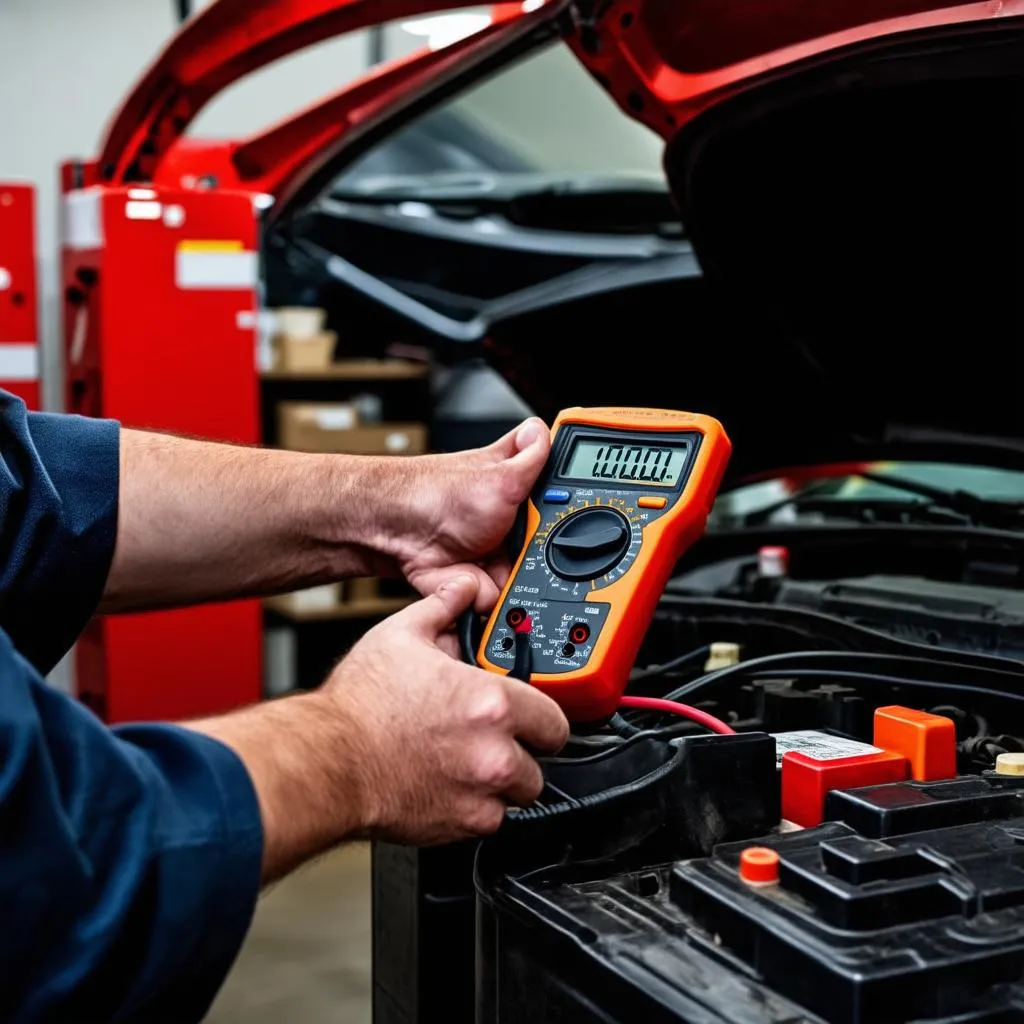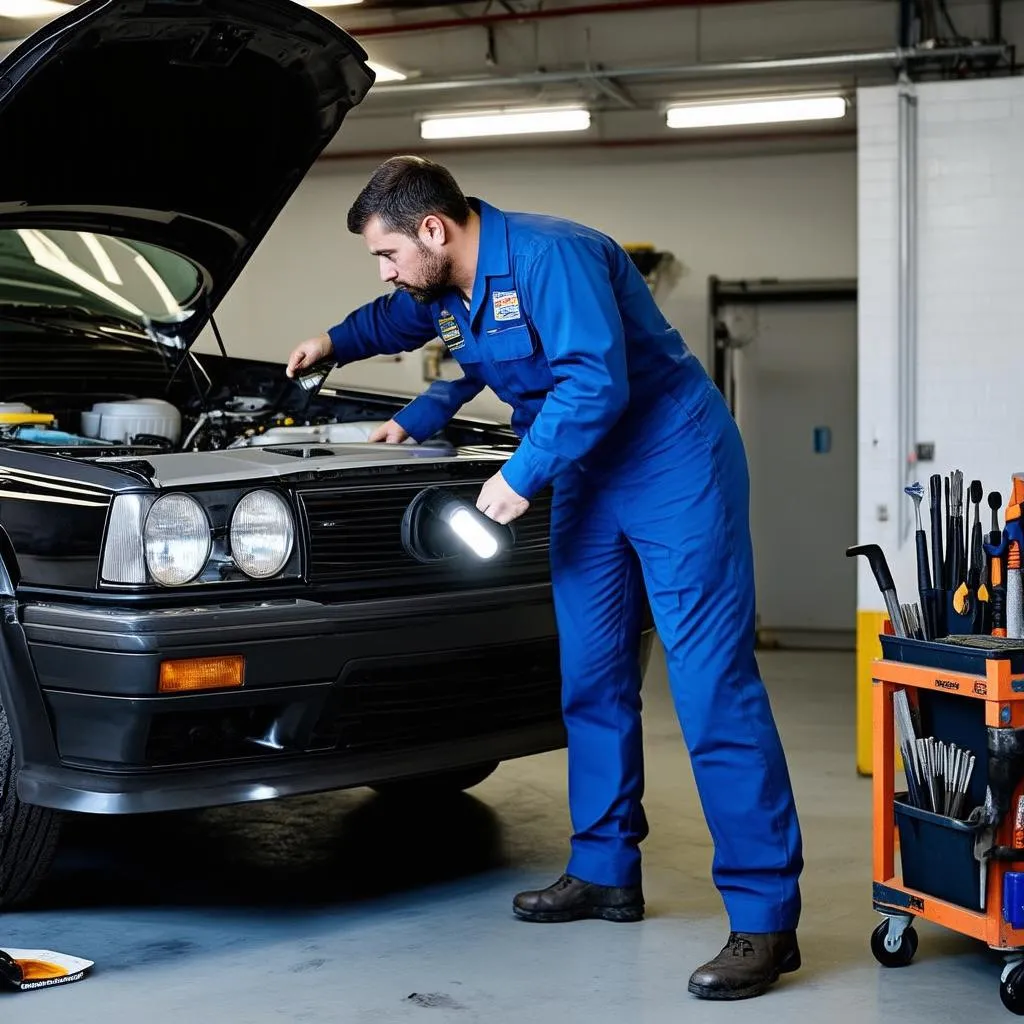Imagine this: you’re running late for work, jump in your car, turn the key, and… nothing. The lights on the dashboard light up like a Christmas tree, but the engine refuses to even try to crank. We’ve all been there, and it’s frustrating! This common car problem can stem from a variety of issues, ranging from a dead battery to a faulty starter. Let’s dive into the reasons why your car lights might be on, but the engine won’t start, and how to troubleshoot the problem.
What Does “Lights On, Car Won’t Start” Really Mean?
Before we jump into solutions, let’s decode what’s happening under the hood. Your car’s electrical system is like its circulatory system. When you turn the key:
- Battery Power: Your battery sends power to the starter and various electrical components.
- Starter Motor: The starter motor engages the engine’s flywheel, setting it in motion.
- Combustion: If all goes well, fuel and air ignite, and your engine roars to life.
When your lights work but your car won’t start, it usually means there’s enough battery power for the lights but not enough to engage the starter motor or initiate the combustion process.
Decoding the Dashboard: Why This Matters
“Knowing the difference between a dying battery and a starter motor on its last legs can save you a tow truck call,” says automotive expert, Dr. Emily Carter, author of “The Everyday Guide to Car Maintenance.” A weak battery might still power your headlights and radio but lack the juice to turn the engine over.
Common Culprits When Your Car Lights Up But Won’t Start
1. Battery Blues: The Usual Suspect
Your battery is often the primary culprit. Here’s why:
- Dead Battery: A completely depleted battery won’t have enough power to do anything.
- Weak Battery: Even a slightly weak battery might struggle to turn the engine over, especially in cold weather.
- Loose Battery Connections: Corroded or loose battery terminals can interrupt the flow of electricity.
Quick Fix Attempts:
- Jump-starting your car can be a temporary solution if the battery is the issue.
- Remember to check your battery terminals for corrosion and clean them if needed.
2. Starter Motor Struggles
Your starter motor is responsible for turning the engine over and getting it started.
- Worn-Out Starter: Like any mechanical part, starter motors wear out over time.
- Clicking Sounds: If you hear clicking sounds when you turn the key, it could signal a failing starter motor.
What to do: If you suspect a starter problem, it’s best to consult a mechanic.
3. Faulty Ignition Switch
The ignition switch sends the signal to activate your starter motor.
- Worn Connections: Over time, the contacts within the ignition switch can wear out, preventing the signal from reaching the starter.
Diagnosis: Diagnosing a faulty ignition switch often requires specialized tools and knowledge.
4. Fuel System Failures
Even with a healthy battery and starter, your engine needs fuel to run.
- Empty Fuel Tank: It seems obvious, but sometimes the solution is simple!
- Clogged Fuel Filter: A clogged fuel filter restricts fuel flow to the engine.
- Faulty Fuel Pump: The fuel pump draws fuel from the tank to the engine. A failing pump won’t deliver fuel effectively.
Check It Out: If you suspect a fuel problem, check your fuel gauge first.
5. Other Potential Issues
- Alternator Problems: While less likely, a failing alternator can also contribute to starting problems.
- Security System Malfunction: Your car’s anti-theft system can prevent starting if it malfunctions.
What To Do When Your Lights Turn On But Car Won’t Start
- Stay Calm and Assess: Don’t panic! Start by checking the obvious—is the car in “Park” or “Neutral”? Is the steering wheel locked?
- Check Battery Connections: Inspect the battery terminals for corrosion or looseness. Tighten them if needed.
- Try Jump-Starting: If you suspect a dead battery, try jump-starting your car using jumper cables and another vehicle.
- Listen Carefully: Pay attention to any sounds when you turn the key. Clicking sounds could indicate a starter motor problem.
- Check for Warning Lights: Take note of any warning lights on your dashboard, such as the check engine light.
- Consult a Mechanic: If the problem persists, it’s best to seek professional help. A mechanic can diagnose the issue accurately using diagnostic tools.
 Car Battery Check
Car Battery Check
Preventing Future Starting Problems
- Regular Battery Maintenance: Have your battery tested regularly, especially as it ages.
- Clean Battery Terminals: Periodically clean your battery terminals with a wire brush and a baking soda solution.
- Address Issues Promptly: Don’t ignore warning signs like slow cranking or dimming lights.
FAQs About Cars That Won’t Start
Q: Can a bad alternator cause my car not to start?
A: Yes, a faulty alternator can eventually drain your battery completely, preventing your car from starting.
Q: Why won’t my car start even after a jump start?
A: If a jump start doesn’t work, the issue might lie with the starter motor, ignition switch, or another component.
Q: What does it mean if my car makes a grinding noise when I try to start it?
A: A grinding noise often indicates a problem with the starter motor, specifically the starter gear not engaging properly.
Need More Help? We’re Just a Message Away!
Dealing with car troubles can be incredibly frustrating. Remember, you’re not alone! If you’re still experiencing starting problems or have any questions, don’t hesitate to reach out to our team of automotive experts. We’re available 24/7 to provide support and guidance. Contact us on WhatsApp at +84767531508, and we’ll help you get back on the road in no time.
 Mechanic Inspecting Engine
Mechanic Inspecting Engine
Keep Exploring: More Car Care Tips and Advice
Want to become more car savvy? We’ve got you covered! Check out these related articles on our website:
- Autel AutoLink AL329 Codes: Understanding What They Mean
- Top of the Line Autel Maxisys: The Ultimate Diagnostic Tool
- Launch X431V vs Autel Scanner: Choosing the Right Diagnostic Tool
Understanding the potential causes and solutions for car starting issues can empower you to take control of the situation. Remember, regular maintenance and prompt attention to warning signs are key to keeping your car running smoothly for years to come.